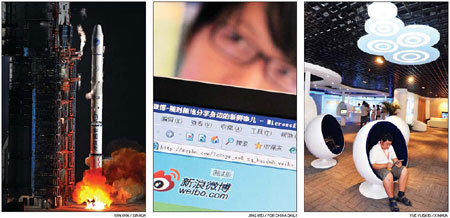
From the Beijing-Shanghai high-speed train to the incredible reach of Sina Weibo, China's contribution to the range of science-based inventions evolved in 2011, the world over, was noteworthy, says Eric Jou.
From the devastating earthquake and tsunami in Japan to the death of the tech giant Steve Jobs, 2011 felt like a year of losses, but this rollercoaster of a year also produced a few technological wonders that are likely to change our lives forever.
Here's the list then, in no specific order:
The iPad 2
At first glance this looks like a slimmer version of the Apples iPad with cameras in the front and rear, but the iPad 2 is, in fact, much more.
Customers purchase iPad 2 tablet computers at electronics retailer Suning's store in Wuhan, capital of Central China's Hubei province, on May 6, 2011. Provided to China Daily
One could say there's nothing new about the iPad 2. Android tablets had front and rear facing cameras and dual core processors. From a non-Apple fan perspective the iPad 2 was just a refresh of the iPad. But its impact is much more than what meets the eye. More power and cameras make the iPad 2 a much more versatile unit, capable of video conferencing, video editing, and hi-definition gaming - all on the go.
Besides, the release of the iPad 2 brought down the price of the original iPad, making it more accessible to users interested in tablet computing.
In 2012, it is perfectly normal to see someone traveling on Line 1 of the Beijing metro watching a movie on his/her iPad, or iPad 2.
Sina Weibo
When Sina's micro blog service, Weibo, opened late in 2009, it looked like a Chinese version of Twitter (launched in 2006).
But 2011 was the year of weibo, the Chinese micro-blogging service took off in a way that couldn't be foreseen. The news of the Wenzhou train crash in July was broken on Weibo, which also helped bring the Guo Meimei scandal to light.
Weibo served as a mix of Facebook and Twitter on the Chinese Internet. It changed the way young people interacted with each other, the way business enterprises advertised and dealt with public grievances. It also changed the way the public gathered and processed information, and ultimately how they expressed themselves online.
According to iResearch, Sina Weibo commanded more than 56.5 percent of the active Internet user market share in China between March 30, 2010 and March 30, 2011. But then there is no telling how long weibo will reign, especially with the new real-name registration regulations coming into effect.
High-speed train
Traveling from Beijing to Shanghai by land without having to spend a day on board is now a reality.
When the Beijing to Shanghai High Speed Railway opened last June, it seemed rife with problems.
Now that the initial glitches are firmly in the past, it's hard to imagine traveling between the political and financial capitals of China without considering the high- speed train as an option.
Having reduced travel time by half, the Beijing-Shanghai High Speed Railway has opened the doors for similar experiments.

Copyright ©1999-2011 Chinanews.com. All rights reserved.
Reproduction in whole or in part without permission is prohibited.